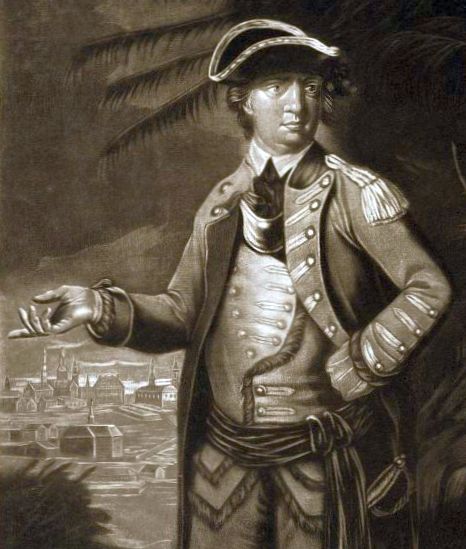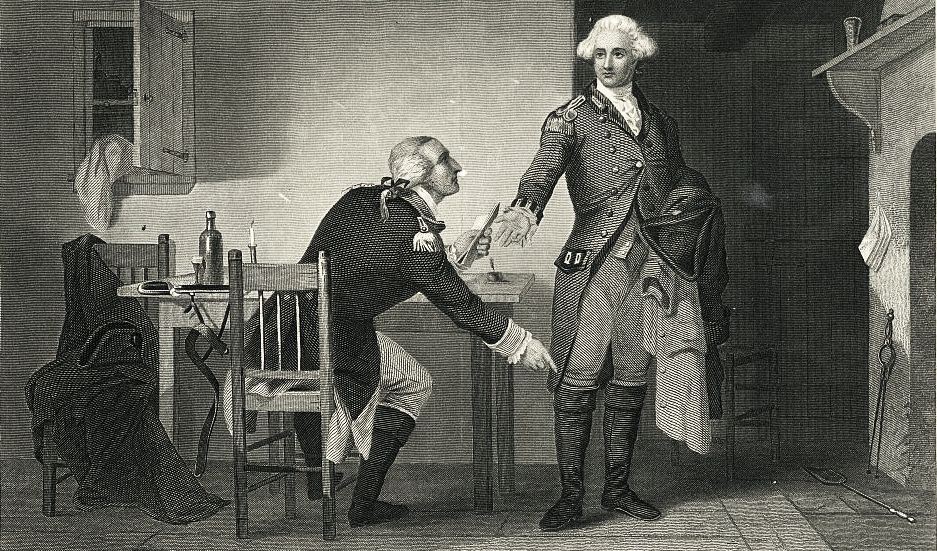It became convenient to portray Benedict Arnold as a conniving traitor, but the truth is more complex. The brilliant general often failed to get credit for his military wins, suffered painful wounds, lost his fortune while others profiteered, and finally gave up on the disorganized and often ineffective efforts to win the American Revolution.
-
Special Issue - George Washington Prize 2017
Volume62Issue4

We all know the story: how a defiant and undisciplined collection of citizen soldiers banded together to defeat the mightiest army on earth. But as those who lived through the nearly decade-long saga of the American Revolution were well aware, that was not how it actually happened.
The real Revolution was so troubling and strange that once the struggle was over, a generation did its best to remove all traces of the truth. No one wanted to remember how after boldly declaring their independence they had so quickly lost their way; how patriotic zeal had lapsed into cynicism and self-interest; and how, just when all seemed lost, a traitor had saved them from themselves.
Charles Thomson was uniquely qualified to write a history of his times. As secretary of the Continental Congress from 1774 to 1789, he had functioned as what one historian has described as the "prime minister" of the Congress. While delegates came and went over the course of the War of Independence, Secretary Thomson was always there to bear witness to the behind-the-scenes workings of the nation's legislative body during its earliest and most critical period. According to his friend John Jay, "no person in the world is so perfectly acquainted with the rise, conduct, and conclusion of the American Revolution as yourself."
Soon after his retirement in July 1789, Thomson set to work on a memoir of his tenure as secretary to the Congress, eventually completing a manuscript of more than a thousand pages. But as time went on and the story of the Revolution became enshrined in myth, Thomson realized that his account, titled "Notes of the Intrigues and Severe Altercations or Quarrels in the Congress," would "contradict all the histories of the great events of the Revolution." Around 1816 he finally decided that it was not for him "to tear away the veil that hides our weaknesses," and he destroyed the manuscript. "Let the world admire the supposed wisdom and valor of our great men," he wrote. "Perhaps they may adopt the qualities that have been ascribed to them, and thus good may be done. I shall not undeceive future generations."
See also "Benedict Arnold: How The Traitor Was Unmasked," by James Thomas Flexner
The American Revolution had two fronts: the war against Great Britain and a civil war so widespread and destructive that an entire continent was seeded with the dark inevitability of even more devastating cataclysms to come. Many of us have heard of the partisan struggles in the South during the final bloody years of the Revolution. But the middle of the country was also torn apart by internal conflict, much of it fought along the periphery of British-occupied New York. Here, in this war-ravaged "Neutral Ground," where neither side held sway, neighbor preyed on neighbor in a swirling cat-and-dog fight that transformed large swaths of the Hudson River Valley, Long Island, and New Jersey into lawless wastelands.
At the epicenter of this self-destructive furor was the patriot capital of Philadelphia. Before and after it was briefly occupied by the British, the city was the scene of religious and political persecution, profiteering, and massive legislative dysfunction. Rather than the paragon of leadership and eloquence that we associate with the passage of the Declaration of Independence in July 1776, the Continental Congress had become, as the testimony of Charles Thomson suggests, the political incarnation of the confusion and hostility that had overtaken the nation as a whole.
By the summer of 1780, America had reached its lowest ebb. The expectations created by a dramatic victory at Saratoga in 1777 had subsided into disillusionment as the much-vaunted alliance with France had so far done nothing to win the war. Exhausted and dispirited by a struggle that was in its fifth year, the American people appeared to have turned their backs on the cause they had once so ardently embraced. Instead of a unified republic governed by a Continental Congress, the United States had devolved into thirteen scrabbling and largely independent polities. If, by some miracle, General Washington should find a way to win the war against the British, the real question was whether there would be a country left to claim victory.
In 1780, one of Washington's greatest generals came to believe that the cause to which he had given almost everything no longer deserved his loyalty. Although it later became convenient to portray Benedict Arnold as a conniving Satan from the start, the truth is more complex and, ultimately, more disturbing. Without the discovery of Arnold's treason in the fall of that difficult year, the American people might never have been forced to realize that the real threat to their liberties came not from without but from within.
The Battle of Saratoga was the pivot point, the place where on October 7, 1777, Benedict Arnold suffered the debilitating injury that ultimately set him on the path to treason. It is also where his nemesis Horatio Gates acquired the renown that allowed him, with the help of key members of the Continental Congress, to challenge Washington's position as commander in chief.
Washington is rightly regarded today as one of the greatest military commanders and statesmen in American history. But like every exceptional leader, he made his share of mistakes. Indeed, to insist that Washington could do no wrong is to deny him his greatest attribute: his extraordinary ability to learn and improve amid some of the most challenging circumstances a commander in chief has ever faced.
Though a soldier, Washington recognized at the beginning of the war that if America was to survive the Revolution with her ideals intact she must be governed by her civil, rather than military, leaders. This meant that he had no choice but to submit to the indignity of being continually second-guessed by a legislative body that had a deep distrust of the army and especially its leader. By 1777 Washington had emerged as the preeminent figure, civilian or military, in America, and for many members of Congress, particularly if they were from New England, the Virginia planter had assumed an aura that was dangerously monarchical. Inevitably the legislators began to employ the same strategies against Washington that they had used to overthrow the British king. The danger was that the revolutionaries' almost knee-jerk urge to undermine whoever was in charge would ultimately lead to anarchy. That Washington resisted the temptation to resign in disgust or, at the other extreme, proclaim himself, like Napoleon, emperor, is a testament to his judgment and almost unbelievable patience.
While Washington had the strength of character to see the long view, Benedict Arnold lived in the messy and highly emotional moment. As he once admitted, "I am a passionate man," and without this passion, he would never have accomplished what he did on the battlefield—accomplishments that garnered from Washington the highest praise. But as Washington also came to realize, Arnold's volatility could be dangerous. The son of a bankrupt alcoholic who had been ruined by his pretensions, Arnold lacked the ability to rise above petty and unjustified criticism. He also had a habit of living beyond his means. Later in the war, after being overlooked for promotion and almost losing his leg to an enemy musket ball at Saratoga, he convinced himself that profiting from his position in the military was justified. When combined with his growing disillusionment with Congress, which in addition to denying him promotion, proved reluctant to reimburse him for his considerable expenses at the beginning of the war, Arnold's need for money helped fuel his gradual creep toward treason.

If Arnold was Washington's dark angel, the young Marquis de Lafayette almost always seemed to be in the light. Only nineteen years old when he and Washington first met, this idealistic, confident, and immensely wealthy French nobleman had a charm and charisma that appealed to just about everyone. Even when the reality hardly justified his optimism, Lafayette maintained a buoyant enthusiasm that stood in marked contrast to Arnold's ever-growing bitterness.
Unlike their American counterparts, for whom the war was what Washington called "this glorious cause," the British generals quickly came to see the struggle as a dreary quagmire out of which few, if any, of them were likely to emerge with their reputations intact. Rather than the aristocratic buffoons and bloody hirelings of later American legend, Generals Howe, Clinton, Carleton, Cornwallis, and Burgoyne were bright, ambitious, and conflicted men forced to fight a people whom they considered to be their countrymen.
Ultimately, however, the story is less about battles won and lost than it is about a people who lived through one of the most tumultuous and creative periods in American history. While Washington, Arnold, Howe, and Lafayette will play major roles in what follows, this book is also the story of the long-suffering soldier from Connecticut who almost single-handedly set the record straight as to what really happened in the ranks of the Continental army; of the mechanical genius who, if not for an uncooperative tide, might have ended the war before it had properly begun; of the Philadelphia lawyer who betrayed Washington's trust before pushing Benedict Arnold to the brink of treason; and of the young wife and mother whose loyalist leanings changed the course of a nation.
Finally, this is the story of a country knit together—and potentially pulled apart—by water. At a time when overland travel was laborious and slow, rivers and lakes held a strategic advantage that is difficult for us to appreciate today in a nation crisscrossed by multilane highways. Extending south from Canada was a corridor of water that both the British and the Americans regarded as the strategic key to the conflict. If the British could establish control of both Lake Champlain to the north and the Hudson River to the south, it would be possible to isolate New England from the rest of the colonies and win the war. As a consequence, New York City and the Hudson River, augmented by Lake Champlain's river-like thrust toward Canada, will serve as the jagged fault line of this book, a book about loyalty and betrayal and the fault line that is in all of us.

